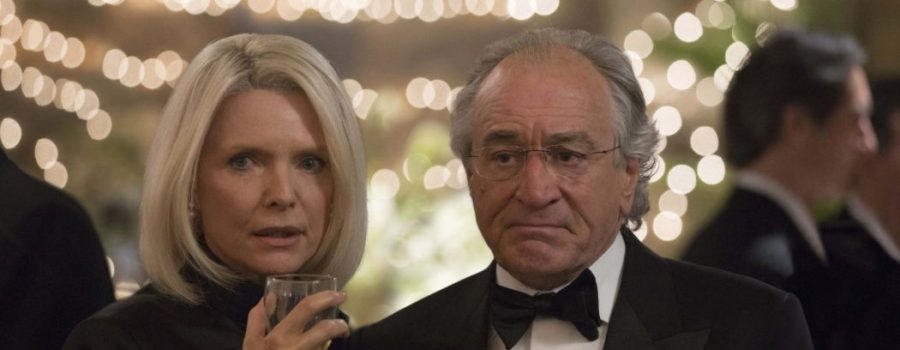[Published at Film Inquiry] Barry Levinson, responsible for some of the most critically well-received films of the last 40 years, provides a somewhat sympathetic analysis of notorious, disgraced stockbroker, Bernie Madoff in The Wizard Of Lies. However assured Levinson’s direction and commanding of setting and characters always are, the blend of docudrama, true crime, and flashback narrative storytelling heeds a slightly pitchy result.
Nonetheless, The Wizard Of Lies’s debut of over $4 million viewers was the highest HBO has had in four years, and further proof that digital platforms reach a far larger audience. Though a bit overlong, it engages the viewer through its complex interpersonal relationships from an adept secondary cast behind an outstanding Robert De Niro as Madoff. With a knack for portraying overtly psychotic characters, De Niro has the opportunity to play a cold sociopath with quiet, subtle ease. De Niro is a revelation, giving his best dramatic performance since A Bronx Tale in 1993.
Madoff’s Moral Madness – From Invincible To Broken
To justify Madoff’s actions by focusing on his twisted moral compass would be ignoring the larger conversations that The Wizard Of Lies begs. Is Madoff a sociopath? Were his actions a product of the economic system in which he operated, or was he part of a small group of corrupt Wall Street executives? What can America as a nation learn from him and other people like him so as to not allow history to repeat itself? It always, inevitably does, but the world is hitting a breaking point, and history can stay just what it is under its dictionary definition. Unfortunately, The Wizard Of Lies doesn’t provide any answers to the questions it asks.
Through flashbacks, we see a pre-economic-crisis Madoff enjoying the typical flourishes billionaires are privileged. Through these flashbacks, the audience sees a pompous affability in De Niro that he hasn’t displayed since Casino. He hosts lavish parties filled with infidelity, expensive food, designer clothing and accessories, and conducts himself with a sense of off-putting entitlement. These are moments where Madoff turns on his “social” button, putting on a front for his family and friends while he robs innocent people blind with his over-40-year, $65 billion Ponzi scheme.

The fits of rage offset the more appeasing characteristics of Madoff’s personality, and De Niro maneuvers in between his polarizing moods effortlessly. Eventually, when the inevitable comes, everything in Madoff’s life crashes down along with the housing market and stock market. Like an earthquake, his actions have aftershocks, repercussions. Not only does he have a family to whom he lied that he needs to make amends with, he has thousands of ruined lives that he must take responsibility for. Yet, Madoff’s reputation seems to remain the most important thing he wants to protect.
De Niro plays the incarcerated Madoff with an emptiness to a deeply unsettling effect. He gets under Madoff’s skin; sure, the makeup and hair department did a wonderful job to capture Madoff’s likeness, but De Niro does his due diligence in embodying a monster. With hours of interview footage to study, De Niro disappears into the role at times, lowering his voice nearly an octave at times and ditching his usual vocal inflections and facial distortions.
Stylistic Wires Crossed
Sometimes, three ins’t the magic number, sorry Schoolhouse Rock! With three separate screenwriters, Sam Levinson, Samuel Baum, and John Burnham Schwartz contributing to The Wizard Of Lies’s source material, three succinct films emerge. Levinson does his best to provide congruity, but even the seasoned veteran can’t save The Wizard Of Lies from a distracting disjointedness.
The three amigos do their best to adapt Diana Henriques’s New York Times Best-Selling novel of the same name, but sometimes too many collaborators can muddle a story. In The Wizard Of Lies, there is a docudrama component that begins the film; Diana Henriques begins the film with a narration about her role in covering the Madoff trial for the New York Times as an investigative journalist. She interviews various members of Madoff family, firm, friends circle, and Madoff himself. Throughout these conversations, the characters look directly at the camera, speaking in retrospect about the events surrounding the scandal.
This also sets up a true crime format, wherein the characters discuss their involvement, or lack thereof, convey their emotions regarding Madoff, while flashbacks show a reenactment of the events. Fortunately, Levinson handles the flashbacks with cinematic realism, as opposed to the typically tacky style seen in true crime television shows. Thankfully, he has veteran actors filling these characters, for that matter.

It is Evgueni and Sacha Galperine’s score, ultimately, that maintains the most consistency of tone throughout the film, that of a solemn, depressing one. It is not an orchestral score, but rather an intimate one, filled with only a handful of instruments. The brothers establish a realistic unease through an persistent rhythmic motif created by plucking muted bass strings.
“21st Century Digital Boy”
Remember that Bad Religion song? As silly as that song may be, it’s reflective of the industry shift occurring before our eyes. I’m beginning to sound like a broken record, but digital platforms are taking over the industry. Sadly, going to the theaters isn’t an occasion like it used to be. Take Memorial Day weekend 2017 in America (May 26 through May 29), for example; it is, historically, the largest box office weekend of year, and a prime opportunity for major studios to release their summer blockbusters.
This Memorial Day weekend box office was the lowest it’s been in 18 years, since 1999, when the decades awaited new entry in the Star Wars prequel trilogy, The Phantom Menace debuted. The films opening earned only $172.3 million. Paul Dergarabedian, Senior Media Analyst at ComScore, the leading media measurement and analytics company for some of the best known corporations in the world, captured the industry unease with this statement:
“It’s crunch time for the industry after a lackluster May and a dismal Memorial weekend. The good news is that June looks to deliver the goods and no movie is better suited to lead the cavalry charge than Wonder Woman later this week. The pressure is certainly on for the final three quarters of the season to get us out of this downturn.”

Meanwhile, as Cannes Film Festival brought the digital versus theatrical distribution debate to a heated head, particularly the division among jurors, festival executives, and audience members, many of who booed Netflix premieres, The Wizard Of Lies made a strong argument for validity of digital releases. Let us say that HBO decided to charge the average theater ticket price of around $14 to its $4 million viewers in its weekend debut on on demand.
Let us assume, then, that the introduction of a price for viewing eliminates 10% of the audience. Even then, the opening weekend box office for The Wizard Of Lies would have been approximately $50,400,000. That is the kind of performance a successful summer action blockbuster would typically have in its opening weekend.
Worth It For De Niro And The Cast Of Characters
Indeed, The Wizard Of Lies succeeds largely due to De Niro’s powerhouse turn as Bernie Madoff. However, the performances of Michelle Pfeiffer as Madoff’s wife, Ruth, Nathan Darrow as the younger son, Andrew Madoff, American Horror Story regular, Lily Rabe as his girlfriend, Catherine, Kristen Connolly as Stephanie Madoff, and Hank Azaria as Frank Dipascali, Madoff’s partner-in-crime, provide a more-than-adept backbone for story.
It is Alessandro Nivola as the ill-fated Mark Madoff, who stands out the most out of the secondary cast. He is sensational, matching De Niro’s quiet intensity with ease. Playing against his suave, confident typecast, Nivola portrays Mark as a beaten dog with its tail between its legs. His character arc is heartbreaking. The focus on the effect Madoff’s actions had on his family is given credibility in the realistic performances and Levinson’s commitment to and trust in his actors.
As choppy and dragging as it may be at times, and although it doesn’t offer any revelations or poignant new insight into Madoff’s character or the ongoing issue of corporate greed and the epidemic of white collar crime, The Wizard Of Lies is an intimate and sobering look at family betrayal.
Were you impressed with the performances in The Wizard Of Lies? Do you think it makes a difference whether it’s seen in homes or in theaters?
The Wizard Of Lies was released on May 20th in the US and June 1 in the UK on HBO.








Leave a Reply
Your email is safe with us.